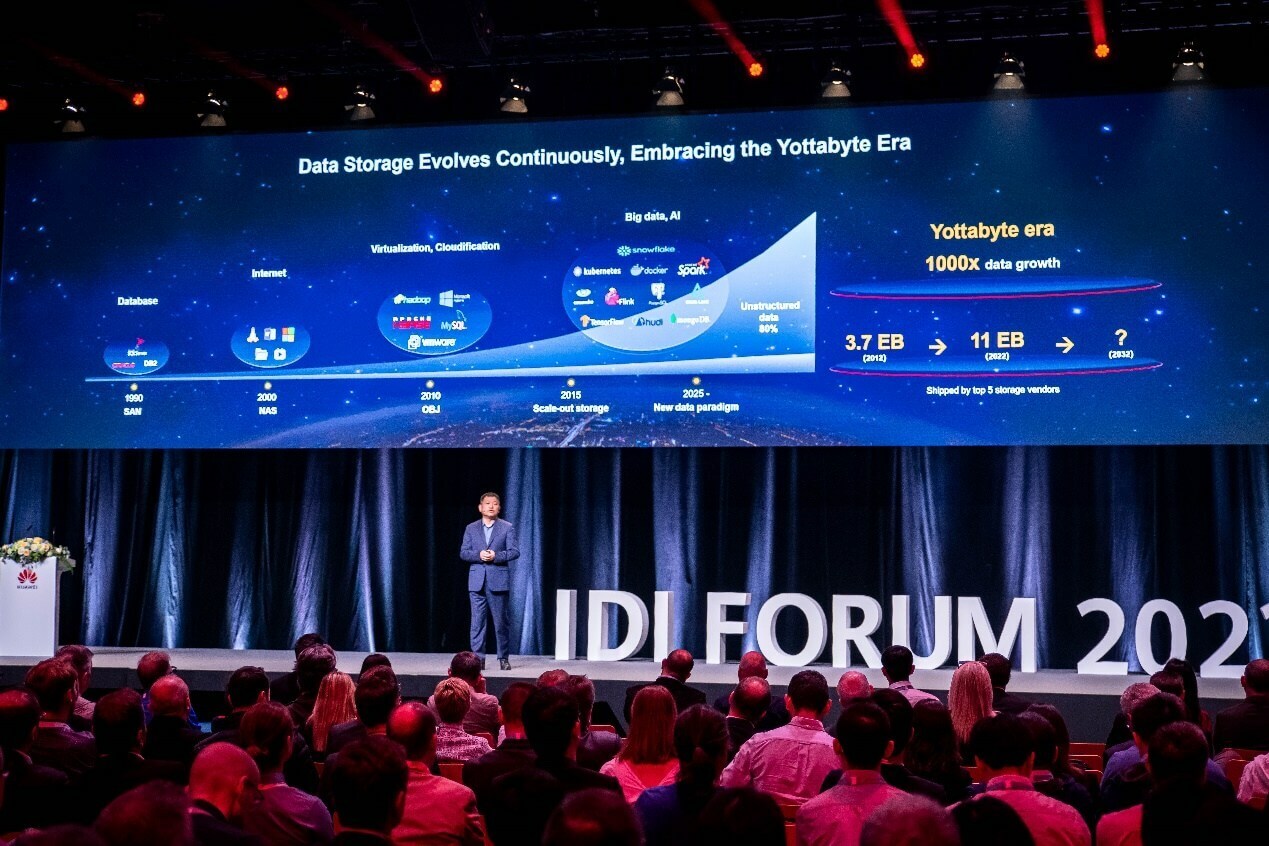 The Innovative Data Infrastructure Forum (IDI Forum) 2023, revolving around the theme of "New Apps ∙ New Data ∙ New Resilience," took place on May 23 in Munich, Germany. The Forum brings together global industry experts and partners to explore the future of digital infrastructure towards the yottabyte era (a yottabyte is equal to a quadrillion gigabytes).
The Innovative Data Infrastructure Forum (IDI Forum) 2023, revolving around the theme of "New Apps ∙ New Data ∙ New Resilience," took place on May 23 in Munich, Germany. The Forum brings together global industry experts and partners to explore the future of digital infrastructure towards the yottabyte era (a yottabyte is equal to a quadrillion gigabytes).
At the forum, Huawei delved into a host of different topics, such as embracing the emerging application ecosystem, efficiently handling masses of unstructured data, and comprehensively improving data resilience, to unlock the value of data towards the evolution of data storage industry.
Huawei believes data storage faces major changes and great opportunities as digital transformation deepens:
- Firstly, 56% of enterprises deploy AI applications while 96% of enterprises plan to build cloud-native applications to deal with ever-changing data applications.
- Then data is growing exponentially. 80% of new data is unstructured data with a compound annual growth rate (CAGR) of 38%.
- Finally, data resilience faces severe challenges. Ransomware is constantly evolving, and the number of ransomware attacks is growing at an annual rate of 98%. Worryingly, over 14% of enterprises are unable to restore their data after a ransomware attack.
Emerging big data and AI applications pose higher requirements on the parallel processing of diversified data. The collaboration model between data storage and data applications is being reconstructed to embrace new data paradigms. Cloud-native applications are becoming more prevalent in enterprise data centers. To tackle these challenges, reliable and high-performance container storage will be a necessity.
As unstructured data used for production and decision-making systems becomes increasingly hot due to real-time access, the read/write bandwidth and I/O access efficiency of scale-out storage need to be significantly improved. To meet the need for cost-effective storage of mass unstructured data, innovations in software, hardware, and algorithms are crucial for scale-out storage. In addition, with the explosion in data volume, severe data gravity challenges arise. Therefore, intelligent data fabric is required to implement global data view and unified data scheduling across systems, regions, and clouds.
Data resilience threats are evolving from natural disasters and physical damage to human-factor disasters such as ransomware. Hence, a shift from reactive response to proactive defense is critical to ensure higher data resilience. The surge in zero-day vulnerabilities and huge losses caused by unrecoverable data reveal the inadequacy of the current enterprise data resilience system. Such a system consists of networks, applications, and hosts, and is no longer adequate for meeting the latest data resilience requirements of enterprises. Data storage is becoming the last line of defense for data resilience, with more resilience features being integrated into data storage products, including ransomware detection, data encryption, secure snapshots, and data recovery in Air Gap.
Dr. Zhou remarked in his speech that Huawei Data Storage provides an extensive range of products and solutions to meet customers' and partners' evolving requirements. OceanStor Dorado All-Flash Storage and OceanStor Pacific Scale-Out Storage were all recognized as a 2023 Customers' Choice in Gartner Peer Insights.
To see the bigger picture of the data storage industry, the total shipment of the world's top five External Controller-Based (ECB) storage vendors in 2022 was 3x higher than that in 2012. However, this figure falls far short of what is required to meet global demands in the yottabyte era.
Huawei predicts that this number will grow tenfold by 2032, exceeding 100 exabytes. Data storage solutions must not only prioritize capacity and performance, but also foster novel data paradigms, intelligent data fabric, and intrinsic data resilience, to unlock the full potential of mass data and empower rapid development of the data storage industry.
Source: Huawei


